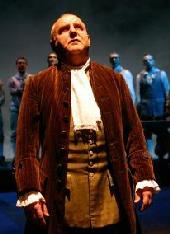SEARCH
REVIEWS
FEATURES
NEWS
Etcetera and
Short Term Listings
LISTINGS
Broadway
Off-Broadway
BOOKS and CDs
OTHER PLACES
Berkshires
London
LA/San Diego
Philadelphia
Elsewhere
QUOTES
On TKTS
LETTERS TO EDITOR
FILM
LINKS
MISCELLANEOUS
Free Updates
Masthead
Writing for us
A CurtainUp  London Review
London Review
 London Review
London ReviewLongitude
|
Will no one listen to me? Is everyone a nincompoop?
Half truths are not lies, son, just the truth waiting to be completed ---- John Harrison |

Anthony O'Donnell centre stage as John Harrison
(Photo: Robert Day) |
At Greenwich Theatre, close to the home of Harrison's clocks and watches at the Old Royal Observatory in Greenwich Park, Fiona Laird's production gives the play its world premiere. Greenwich is home too, to historic places recording Britain's maritime history. Longitude is as much about the welfare of those seafarers who had to risk their lives at sea as a chronological account of Harrison's struggle for recognition.
Harrison was not only a carpenter and clockmaker, but a choirmaster, and this gives the production the idea of punctuating the scenes with sea shanties, psalms and even sung nursery rhymes some of them conducted by Harrison. The other cyclical repetition is in the description of all the ships that are wrecked, the men lost, the exotic cargoes sunk, while England waits for a reliable system of navigation. Harrison with his belief in the accuracy of his clock, even at sea, is pitted against the Reverend Nevil Maskelyne (Giles Taylor) one of the so-called "lunarists" who believed that the navigation problem would only be solved with reference to the moon, planets and stars.
Anthony O'Donnell well conveys the character of the doughty and blunt Lincolnshire inventor. At every turn he is subverted by the establishment, "the preachers and professors", as he calls the worthy gentlemen called upon to adjudicate the awarding of the Longitude prize. Mossie Smith is the lone female, the voice Harrison's wife Lizzie, narrates the story. Scientific explanations are presented in response to her questions, as they were by Nils Bohr's wife in Micahel Frayn's play Copenhagen. The ensemble cast doffing long wigs, cloaks and wing collars change part seamlessly and believably. I particularly liked Christopher Staines as Dr Edmund Halley and Dr Demainbray, the Swiss tutor to George III.
Anthony Lamble's pretty circular set with its cloud filled backdrop is topped by a ship's mast and the deck is partly confined by a balustrade. The background cast double as seamen, choristers and members of the Longitude board of worthies and the set effectively serves as sea deck, formal hall and church choir stalls.
There is little doubt in my mind that the reason Arnold Wesker was fascinated by Dava Sobel's book is that he personally identified with John Harrison. Wesker maybe sees himself as a similar genius thwarted by the British theatrical and arts establishment.
For all its interest as an historical account of a real man pitted against the establishment, I feel Longitude leaves something lacking dramatically. Each scene just seems to compound the obstinacy of the prize givers and of Harrison himself. This may be why dramatists often interfere with truth and history in order to deliver wonderful plays. Of course we have seen the great Michael Gambon in the television dramatisation of Longitude and that is a hard act to follow. Fiona Laird's production is without fault and Wesker's play tells a good story. It is didactic and conveys historical atmosphere well and I think could have a future life as a perfect production for schools.
|
LONGITUDE
Written by Arnold Wesker after the novel by Dava Sobel Directed by Fiona Laird Starring: Anthony O'Donnell With: Hadley Fraser, Kieran Hill, Dominic Marsh Mark Meadows, Mossie Smith, Christopher Staines, Giles Taylor, James Thorne, Nick Tigg Design: Anthony Lamble Lighting: Ian Scott Sound: Neil Fulcher Composer and Musical Supervisor: Paul Englishby Running time: Two hours 15 minutes with one interval Box Office: 020 8858 7755 Booking at Greenwich Theatre until 29th October 2005 Reviewed by Lizzie Loveridge based on 10th October 2005 performance at Greenwich Theatre, Crooms Hill, London SE10 (Rail/DLR: Greenwich/ Cutty Sark) |





